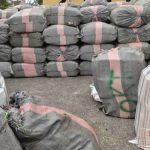In response to the escalating crisis of illegal mining, known as galamsey, the government has deployed over 100 armed military personnel to key water bodies across Ghana.
This initiative is part of a broader effort to combat the environmental destruction caused by illegal mining, which has severely impacted the country’s rivers, farmlands, and forests.

The decision to send additional military forces follows significant pressure from more than 50 civil society organizations (CSOs), both state and private, demanding urgent action to halt the devastation.
These groups have been advocating for stronger measures to address the severe environmental impacts of galamsey, particularly the contamination of water bodies that poses serious health risks to local communities.
To enhance efforts against illegal mining, President Nana Addo Dankwa Akufo-Addo has instructed the Minister for Defence to strengthen “Operation Halt,” a military-led initiative aimed at eliminating illegal mining activities. This ongoing operation is now receiving reinforcements to improve its effectiveness.
While the government has not officially disclosed the specific areas for military deployment, sources from Channel One News indicate that the Eastern Region will be the initial focus. The Birim River and other water bodies in this area have been heavily polluted by illegal mining, making them prime targets for intervention.
In addition to ground forces, naval boats will be stationed on key polluted rivers to enforce a ban on all mining activities, legal or illegal. The goal is to mitigate contamination caused by hazardous chemicals used in galamsey operations, such as mercury and cyanide, which have tainted water sources and degraded land.
The government’s intensified efforts to combat galamsey come amid rising public outcry and calls for action from environmental advocates.
Many view the military deployment as a crucial step in protecting the country’s natural resources and ensuring long-term sustainability.
This deployment is also expected to support the recovery of severely affected rivers like the Ankobra, Pra, and Birim.
By directly addressing the environmental damage, the government aims to restore these vital water sources and safeguard the health and livelihoods of the communities that rely on them.
























































![[FREE FREE MONEY] Predict and Win a Guaranteed GH¢200 From Us EVERY WEEK](https://wordpress.ghanatalksradio.com/wp-content/uploads/2022/02/Predict-and-Win-Final-09-03-2021-218x150.jpg)
![[Predict & Win – 8th/Oct.] WIN A Guaranteed ¢200 From Us This Week](https://wordpress.ghanatalksradio.com/wp-content/uploads/2021/10/maxresdefault-16-218x150.jpg)
![[Predict & Win – 2nd] WIN A Guaranteed ¢200 From Us This Week](https://wordpress.ghanatalksradio.com/wp-content/uploads/2021/09/maxresdefault-50-218x150.jpg)
![[Predict & Win – 25th] WIN A Guaranteed ¢200 From Us This Week](https://wordpress.ghanatalksradio.com/wp-content/uploads/2021/09/maxresdefault-36-218x150.jpg)
![[Predict & Win – 18th] WIN A Guaranteed ¢200 From Us This Week](https://wordpress.ghanatalksradio.com/wp-content/uploads/2021/09/maxresdefault-23-218x150.jpg)







![[National cathedral] See full list of churches that have contributed since 2018](https://wordpress.ghanatalksradio.com/wp-content/uploads/2020/09/Ghana-National-Cathedral-GhanaTalksRadio-100x70.jpg)



